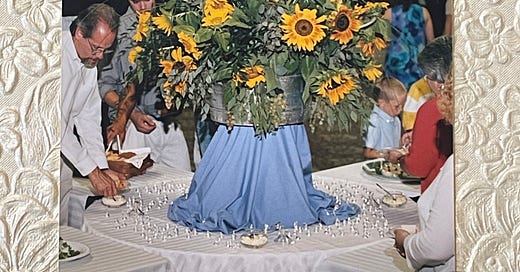by Rachel S. Donahue
I wrote this piece for our recent Habit summer writers’ retreat and read it aloud during story night. I think maybe some of you might need to hear it, too.
Nearly twenty-two years ago, the sunflowers I had grown in my parents’ garden were on full display in gorgeous centerpieces at my wedding reception. Friends and family members had traveled to my hometown in Middle Tennessee to watch us exchange our wedding vows over that Fourth of July weekend, so Mick and I sent them home with little packets of seeds we’d harvested from my sunflowers the previous year. It was like sending a piece of the beauty of our day back home with them.
Many of those friends and family members planted their seeds, and for two or three years following, we’d get reports back of the joy those flowers were bringing, to the second and third generation. The seeds that we had scattered were reaping a harvest of beauty in far-reaching places.
Late last year, my parents moved away from the house where we’d grown the garden that sprouted those seeds. They are now our neighbors in North Carolina, just four houses down on the same side of the street, and we share a new family garden plot behind both our houses.
One of the many things they discovered during their move out here were leftover packets of sunflower seeds from our wedding, still dry and secure more than twenty years later. When Jonathan Rogers and I were discussing the theme for this summer’s retreat (“Tending Your Patch of Ground”) I told him I had just planted those seeds in hopes that they’d bloom yet again.
“If they pull through, twenty years later, I’m definitely writing about it,” I told him with a laugh.
“Huh-uh! No cherry picking!” he gently scolded me. “You also have to write about it if they don’t pull through. That means something, too.”
I didn’t want to hear it, but he was right. I knew I’d have to write about those seeds either way.
We watered, and waited, and watched everything in the garden sprout and begin to bloom—except those sunflowers. They lay dead in the ground where we planted them.
Turns out, seeds aren’t meant to be kept dry and tidy in a secure place for twenty years. They’re meant to be scattered and dirty and used up. They’re meant to sprout with life so they can bear fruit with more seeds—generations and generations of seeds.
When Mick and I were a young married couple preparing for career work overseas in areas that required creative avenues for the gospel, we were introduced to a woman who had come to know Jesus in a place hostile to conversions. Because she’d chosen to follow him, she’d had to flee her family and her country and change her name because she had a fatwa on her head—a pronouncement of death. This was a woman who wore tennis shoes all the time, to remind her that she was always on the run. Mick and I knew that the work we were preparing to do would be hard and would require much toil with little fruit, but when I told her this, she gently interrupted me and scolded me with a wag of her finger. She grabbed my hand, turned it palm up, and wrapped her hand around mine, closing my fingers into a fist.
“You have a bag of seeds in your hand,” she said. “Scatter them wherever you go.”
That’s the only interaction I’ve ever had with the woman. She left for the airport with our friends shortly after that conversation. I don’t even know her real name. But that moment, that image, has stayed with me for nearly twenty years.
If you’re a writer, raise your hand. (Yes, dear reader, you too. Go ahead. Raise that hand into the air. It’s OK if the people around you stare at you like you’re a weirdo.) Now bring your hand down and turn it palm upward. Close your fingers into a fist.
You, dear ones, have seeds in your hand. Don’t tuck them away and hide them until they’re bone dry and brittle. Scatter them, liberally, to the wind. It’s OK if it’s messy. These seeds were meant to bear life. Scatter them with abandon. Some of them might bloom in far away places. Some of them will bear much fruit. Yours is only to be faithful with what’s in your hand.
June 24, 2025 - Release of Not to Be, a mystery novel for older readers by Katherine Ladny Mitchell - Preorders OPEN
July 18–20, 2025 - Bandersnatch at the Realm Makers Expo in Grand Rapids, Michigan. Learn more
August 29–September 1, 2025 - Bandersnatch at Matthews Alive Festival in Matthews, North Carolina. Learn more.
September 24, 2025 - Release of The Song of the Stone Tiger, a middle grade fantasy novel by Glenn McCarty
November 2025 - Release of Joe the Fourth and the King’s Crown, a lower middle-grade novel by Mary Barrows
November 2025 - Release of I’ve Got a Bad Case of Poetry, our illustrated children’s poetry anthology edited by Rachel S. Donahue - Preorder on the Kickstarter Platform
What does I’ve Got a Bad Case of Poetry include? A fully illustrated spread with a poem about the girl who would not let her mother comb her hair…and 170 more poems!
Coming this November—preorder through Kickstarter!












Thank you, that was beautiful. I’ll keep writing, even if only my family ever sees the flowers.
Love this, Rachel!